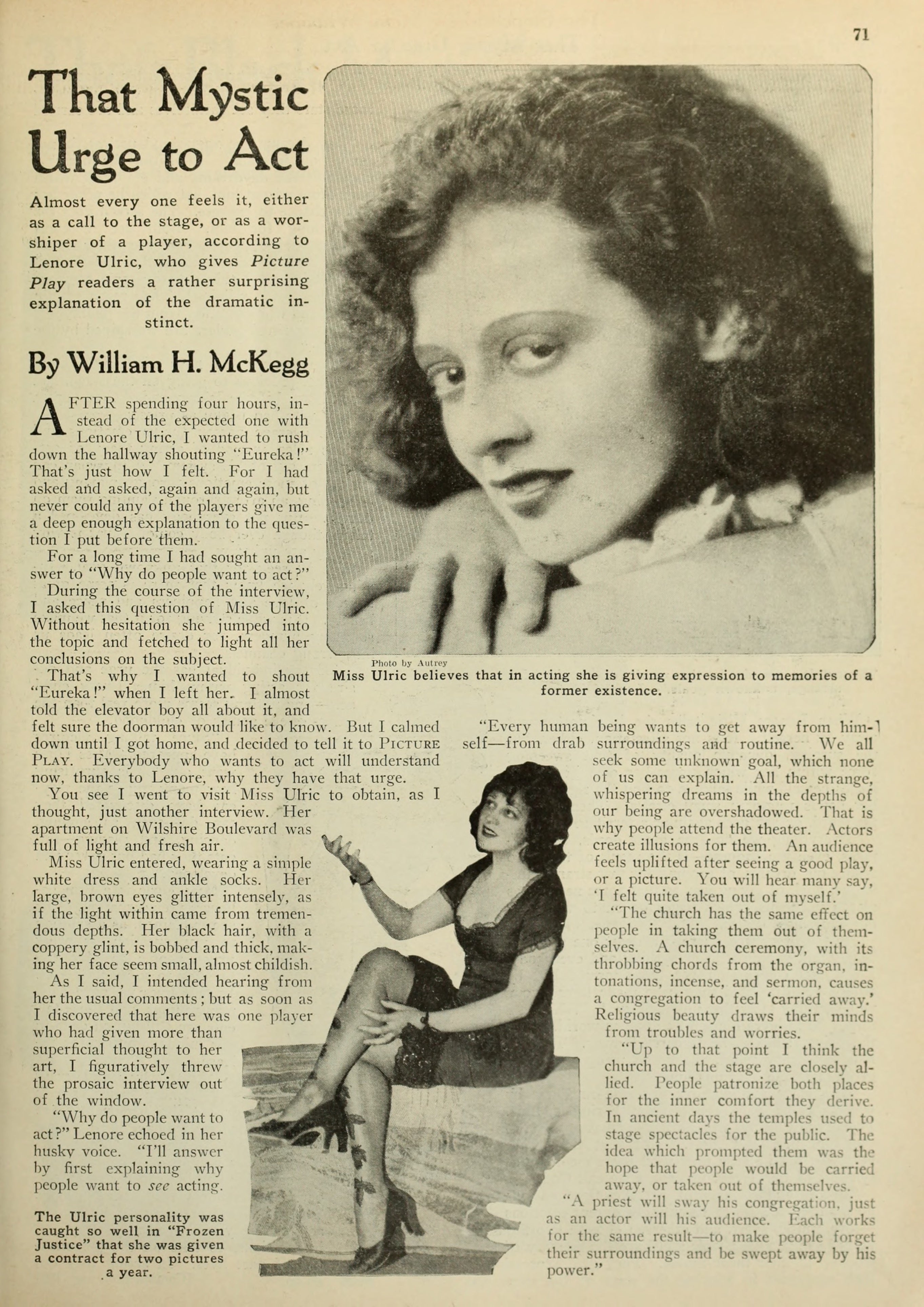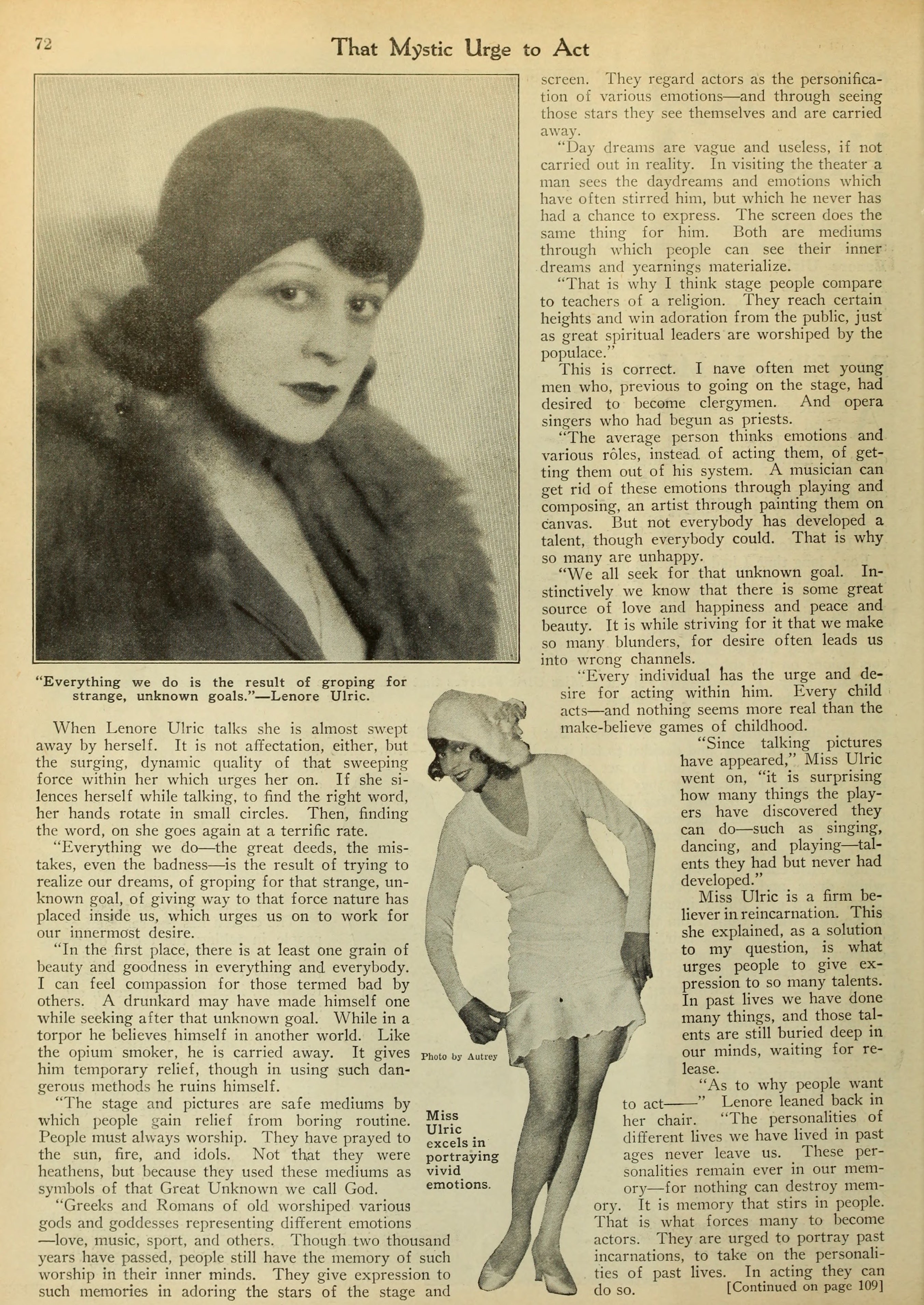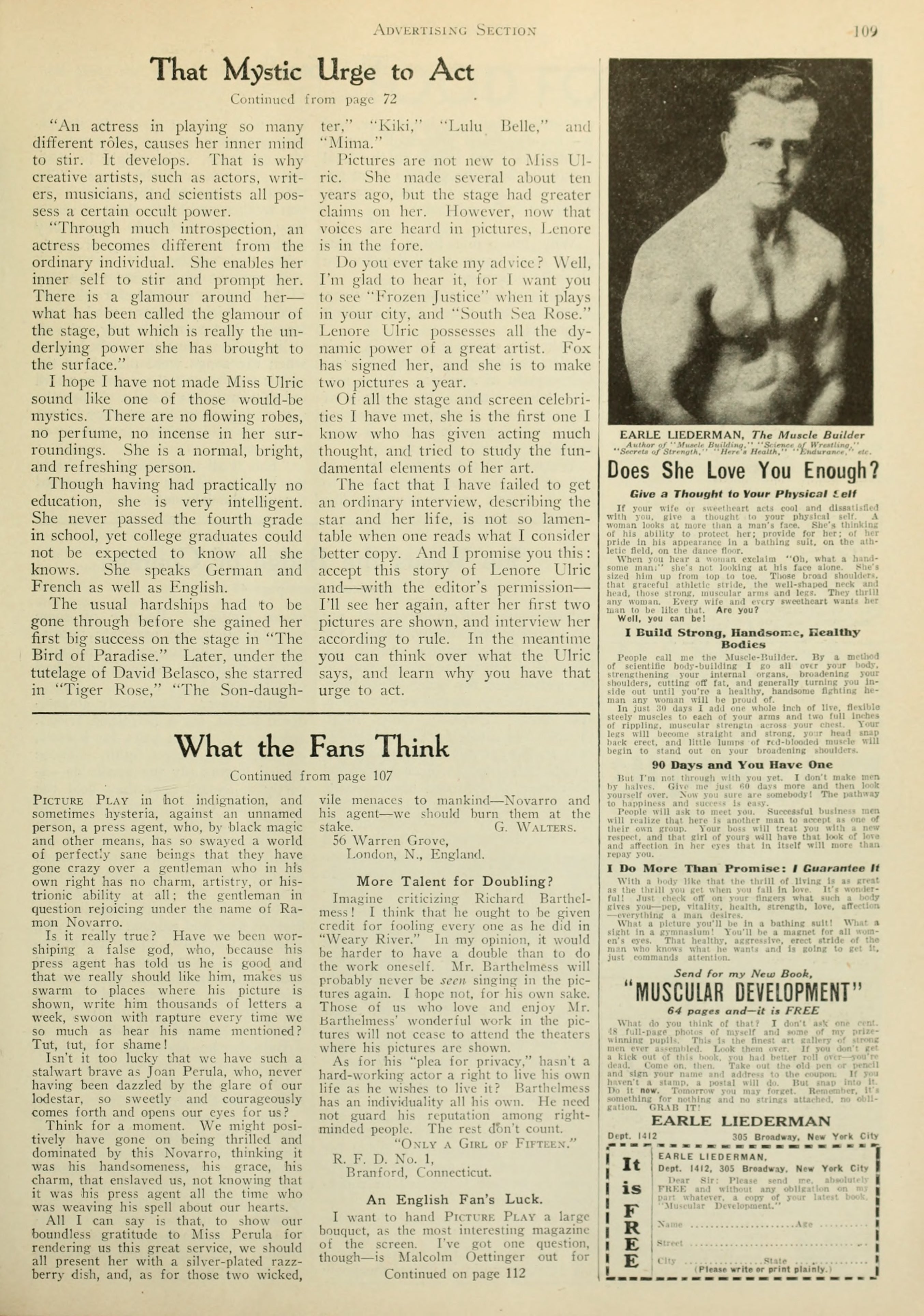Lenore Ulric — That Mystic Urge to Act (1929) 🇺🇸

After spending four hours, instead of the expected one with Lenore Ulric, I wanted to rush down the hallway shouting “Eureka!” That’s just how I felt. For I had asked and asked, again and again, but never could any of the players give me a deep enough explanation to the question I put before them.
by William H. McKegg
For a long time I had sought an answer to “Why do people want to act?”
During the course of the interview, I asked this question of Miss Ulric. Without hesitation she jumped into the topic and fetched to light all her conclusions on the subject.
That’s why I wanted to shout “Eureka!” when I left her. I almost told the elevator boy all about it, and felt sure the doorman would like to know. But I calmed down until I got home, and decided to tell it to Picture Play. Everybody who wants to act will understand now, thanks to Lenore, why they have that urge.
You see I went to visit Miss Ulric to obtain, as I thought, just another interview. Her apartment on Wilshire Boulevard was full of light and fresh air.
Miss Ulric entered, wearing a simple white dress and ankle socks. Her large, brown eyes glitter intensely, as if the light within came from tremendous depths. Her black hair, with a coppery glint, is bobbed and thick, making her face seem small, almost childish.
As I said, I intended hearing from her the usual comments; but as soon as I discovered that here was one player who had given more than superficial thought to her art, I figuratively threw the prosaic interview out of the window.
“Why do people want to act?” Lenore echoed in her husky voice. “I’ll answer by first explaining why people want to see acting.
“Every human being wants to get away from himself — from drab surroundings and routine. We all seek some unknown goal, which none of us can explain. All the strange. whispering dreams in the depths our being are overshadowed. That is why people attend the theater. Actors create illusions for them. An audience feels uplifted after seeing a good play, or a picture. You will hear many say. ‘I felt quite taken out of myself.’
“The church has the same effect on people in taking them out of themselves. A church ceremony, with its throbbing chords from the organ, intonations, incense, and sermon, causes a congregation to feel ‘carried away.’ Religious beauty draws their minds from troubles and worries.
“Up to that point I think the church and the stage are closely allied. People patronize both places for the inner comfort they derive. In ancient days the temples used to stage spectacles for the public. The idea which prompted them was the hope that people would be carried away, or taken out of themselves.
“A priest will sway his congregation, just an actor will his audience. Each works for the same result — to make people forget their surroundings and be swept away by his power.”
When Lenore Ulric talks she is almost swept away by herself. It is not affectation, either, but the surging, dynamic quality of that sweeping force within her which urges her on. If she silences herself while talking, to find the right word, her hands rotate in small circles. Then, finding the word, on she goes again at a terrific rate.
“Everything we do — the great deeds, the mistakes, even the badness — is the result of trying to realize our dreams, of groping for that strange, unknown goal, of giving way to that force nature has placed inside us, which urges us on to work for our innermost desire.
“In the first place, there is at least one grain of beauty and goodness in everything and everybody. I can feel compassion for those termed bad by others. A drunkard may have made himself one while seeking after that unknown goal. While in a torpor he believes himself in another world. Like the opium smoker, he is carried away. It gives him temporary relief, though in using such dangerous methods he ruins himself.
“The stage and pictures are safe mediums by which people gain relief from boring routine. People must always worship. They have prayed to the sun, fire, and idols. Not that they were heathens, but because they used these mediums as symbols of that Great Unknown we call God.
“Greeks and Romans of old worshiped various gods and goddesses representing different emotions — love, music, sport, and others. Though two thousand years have passed, people still have the memory of such worship in their inner minds. They give expression to such memories in adoring the stars of the stage and screen. They regard actors as the personification of various emotions — and through seeing those stars they see themselves and are carried away.
“Day dreams are vague and useless, if not carried out in reality. In visiting the theater a man sees the daydreams and emotions which have often stirred him, but which he never has had a chance to express. The screen does the same thing for him. Both are mediums through which people can see their inner dreams and yearnings materialize.
“That is why I think stage people compare to teachers of a religion. They reach certain heights and win adoration from the public, just as great spiritual leaders are worshiped by the populace.”
This is correct. I nave often met young men who, previous to going on the stage, had desired to become clergymen. And opera singers who had begun as priests.
“The average person thinks emotions and various roles, instead of acting them; of getting them out of his system. A musician can get rid of these emotions through playing and composing, an artist through painting them on canvas. But not everybody has developed a talent, though everybody could. That is why so many are unhappy.
“We all seek for that unknown goal. Instinctively we know that there is some great source of love and happiness and peace and beauty. It is while striving for it that we make so many blunders, for desire often leads us into wrong channels.
“Every individual has the urge and desire for acting within him. Every child acts — and nothing seems more real than the make-believe games of childhood.
“Since talking pictures have appeared,” Miss Ulric went on, “it is surprising how many things the players have discovered they can do — such as singing, dancing, and playing — talents they had but never had developed.”
Miss Ulric is a firm believer in reincarnation. This she explained, as a solution to my question, is what urges people to give expression to so many talents. In past lives we have done many things, and those talents are still buried deep in our minds, waiting for release.
“As to why people want —” Lenore leaned back in her chair. “The personalities of different lives we have lived in past ages never leave us. These personalities remain ever in our memory — for nothing can destroy memory. It is memory that stirs in people. That is what forces many to become actors. They are urged to portray past incarnations, to take on the personalities of past lives. In acting they can do so.
“An actress in playing so many different roles, causes her inner mind to stir. It develops. That is why creative artists, such as actors, writers, musicians, and scientists all possess a certain occult power.
“Through much introspection, an actress becomes different from the ordinary individual. She enables her inner self to stir and prompt her. There is a glamour around her — what has been called the glamour of the stage, but which is really the underlying i tower she has brought to the surface.”
I hope I have not made Miss Ulric sound like one of those would-be mystics. There are no flowing robes, no perfume, no incense in her surroundings. She is a normal, bright, and refreshing person.
Though having had practically no education, she is very intelligent. She never passed the fourth grade in school, yet college graduates could not he expected to know all she knows. She speaks German and French as well as English.
The usual hardships had to be gone through he fore she gained her first big success on the stage in The Bird of Paradise. Later, under the tutelage of David Belasco, she starred in Tiger Rose, The Son-Daughter, Kiki, Lulu Belle, and Mima.
Pictures are not new to Miss Ulric. She made several about ten years ago, but the stage had greater claims on her. However, now that voices are heard in pictures, Lenore is in the fore.
Do you ever take my advice? Well, I’m glad to hear it. for I want you to see Frozen Justice when it plays in your city, and South Sea Rose. Lenore Ulric possesses all the dynamic power of a great artist. Fox has signed her, and she is to make two pictures a year.
Of all the stage and screen celebrities I have met, she is the first one I know who has given acting much thought, and tried to study the fundamental elements of her art.
The fact that I have failed to get an ordinary interview, describing the star and her life, is not so lamentable when one reads what I consider better copy. And I promise you this: accept this story of Lenore Ulric and — with the editor’s permission — I’ll see her again, after her first two pictures are shown, and interview her according to rule. In the meantime you can think over what the Ulric says, and learn why you have that urge to act.

Miss Ulric believes that in acting she is giving expression to memories of a former existence.
Photo by: Max Munn Autrey (1891–1971)
The Ulric personality was caught so well in Frozen Justice that she was given a contract for two pictures a year.

“Everything we do is the result of groping for strange, unknown goals.” — Lenore Ulric.
Miss Ulric excels in portraying vivid emotions.
Photo by: Max Munn Autrey (1891–1971)

Collection: Picture Play Magazine, December 1929
